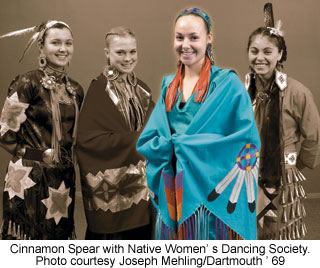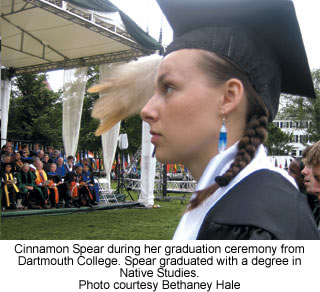 |
Canku Ota
|
 |
|
(Many Paths)
|
||
|
An Online Newsletter
Celebrating Native America
|
||
|
November 1, 2009 - Volume
7 Number 11
|
||
|
|
||
|
Cinnamon Spear Stresses
The Importance Of Education
|
||
|
by Kelly Koepke - Indian
Country Today correspondent
|
||
|
Northern Cheyenne student leaves home wanting to return and help
"Because of my parents' experiences going to college, and their understanding of how important education is, they raised me to understand that school is important," Spear said. "College was expected, and not an option. Many families don't value education. I'm very glad I was raised in a family that did." Spear's degree in Native Studies, a program for which Dartmouth is nationally recognized, helped open her eyes to the diversity of what being an Indian is. The college's need-based financial aid programs made it possible for her to attend, as did Spear's academic achievement. She received half of the scholarships awarded at her graduation ceremony at Lame Deer High School. But it wasn't the financial aid that convinced Spear to spend four years in New Hampshire instead of taking a full-ride offered to her by Montana State. She chose Dartmouth after a visit to the campus. "Dartmouth had a senior fly-in program, so I went to the campus for three to four days. We got to sit in on classes, and we met with the Native American group here. But when I was accepted to Dartmouth, I had a fear of how I would do there, especially knowing that many of my classmates had gone to private schools with better resources. In the chemistry class in Lame Dear, we didn't even have Bunsen burners. We couldn't do many things because we didn't have funding."
She intended on majoring in biology. But like many college students, she switched. In her case, Native American studies, headed by professor Colin Calloway, became her passion. "After one course and learning so much history, law and policy that I didn't know, I saw that I was completely ignorant of the experiences of other tribes. I felt that, though I wanted to be a doctor or work for the Indian Health Service, I needed to understand why IHS exists." While at Dartmouth, Spear immersed herself in social activities. She was the coordinator of the Native Women's Dancing Society, made up of young women from several tribes who came together weekly to talk, make costumes, practice and perform. She served as social chair and service coordinator for the Epsilon Chapter of Alpha Pi Omega Sorority Inc., the first historically American Indian sorority. Spear helped create events that fulfilled the group's mission of serving Native communities. Dartmouth also has a Native American house, a place for students to cook food, play music and commune. Looking back after her Dartmouth graduation, Spear thinks knowing the experiences of other American Indian peoples – in the past and today – will better equip her when she goes to medical school. She points to the many people she was exposed to, none of whom she would have met back home. "The network I now have across the country and in Indian country is truly beneficial. If I'd stayed in Montana, I'd only know those in the state. I was able to learn about different cultures, and be exposed to other Native Americans, their languages and beliefs, which is important. That'll help me later in life, if I choose to work at an IHS facility." She said being around the many cultures, international students, races, and people of diverse backgrounds and mindsets was influential in helping her form her own thoughts. "I understand what I stand for now. I wouldn't have grown so much as a person if I'd stayed close to home." While in college, Spear was able to travel around the United States on volunteer trips. She even ventured overseas to Lithuania and Poland. There, she learned about the Holocaust as she helped preserve a Jewish cemetery. "As a Native American, I have an understanding of genocide that most Americans don't. Many students in the program were ignorant of their own American history and genocide against Indians. Because college isn't just about course work; it's about experiences outside of the classroom that take you places – that make you meet people." If there is one thing Spear would communicate to high school and younger students, especially those on reservations, is that so much happens at college that is never conveyed to Native American students beyond academics. That's why, she says, they don't want to attend college. She aims to spark their interest because she believes the only way to help people is through education. "If people get educated, they learn new skills. It's not just about the degree. If we could get more Indian people to get degrees, teach them about the economy, they could start businesses to boost their job markets. Where I live, teen pregnancy and poverty are problems because people drop out of school because they don't value education."
Though Spear encourages an education outside the reservation, she also knows how important it is to learn her people's ways. "People at home need us as much as we need them. Some people who stay at home don't realize how important home is. Some need to step away to learn that." It was hard for her to be away from her family, who were unable to attend her recent Dartmouth graduation ceremony. "I was heartbroken when she went away to school," said Spear's mother, Gladys Limberhand. "But I knew I couldn't keep her close, because she needed to get a formal education so she could come back and help her people. Her dad did the same thing, and now he helps people. Cinnamon's going to go far. It comes naturally to her." Spear is still focused on working for IHS, and will enter a pre-medical program at Montana State in the fall to finish her science prerequisites before applying to medical school. This summer, she's spending time with family and friends. "Now I have the freedom to do what I want. I want to write about the Native American experiences that the rest of America doesn't know about."
|
||
|
|
||
|
|
||
| Canku Ota is a free Newsletter celebrating Native America, its traditions and accomplishments . We do not provide subscriber or visitor names to anyone. Some articles presented in Canku Ota may contain copyright material. We have received appropriate permissions for republishing any articles. Material appearing here is distributed without profit or monetary gain to those who have expressed an interest. This is in accordance with Title 17 U.S.C. Section 107. | ||
|
Canku Ota is a copyright ©
2000, 2001, 2002, 2003, 2004, 2005, 2006, 2007, 2008, 2009 of Vicki
Barry and Paul Barry.
|
||
 |
 |
|
|
The "Canku
Ota - A Newsletter Celebrating Native America" web site and
its design is the
|
||
|
Copyright ©
1999, 2000, 2001, 2002, 2003, 2004, 2005,
2006, 2007, 2008, 2009 of Paul
C. Barry.
|
||
|
All Rights Reserved.
|
||
 Cinnamon
Spear knows the value of a good education. The recent Dartmouth
College graduate grew up on the Northern Cheyenne Indian Reservation
in the small community of Lame Deer. The list of her accomplishments
in high school and college is as long and diverse as her interests
– science, dancing, filmmaking, community activities and
ultimately, service to her people in Montana.
Cinnamon
Spear knows the value of a good education. The recent Dartmouth
College graduate grew up on the Northern Cheyenne Indian Reservation
in the small community of Lame Deer. The list of her accomplishments
in high school and college is as long and diverse as her interests
– science, dancing, filmmaking, community activities and
ultimately, service to her people in Montana. One
of her independent study projects at Dartmouth, the film "Fort Robinson
Outbreak Spiritual Run 2008," which she produced, documents her
tribe's annual commemoration of the 1879 attempt by Northern Cheyenne
people to return home to Montana from government-imposed captivity
at Fort Robinson, Neb. Not only did the film screen at Dartmouth,
it was shown at career day at her high school. "I can write a 30-page
paper, but the film was a venue that more people saw and will see."
One
of her independent study projects at Dartmouth, the film "Fort Robinson
Outbreak Spiritual Run 2008," which she produced, documents her
tribe's annual commemoration of the 1879 attempt by Northern Cheyenne
people to return home to Montana from government-imposed captivity
at Fort Robinson, Neb. Not only did the film screen at Dartmouth,
it was shown at career day at her high school. "I can write a 30-page
paper, but the film was a venue that more people saw and will see."